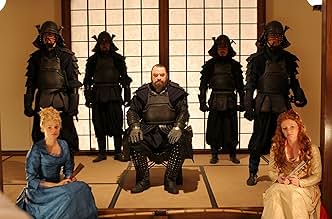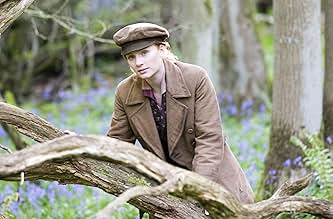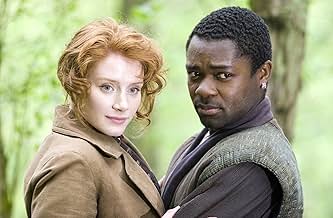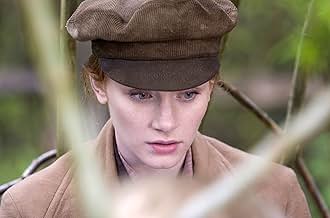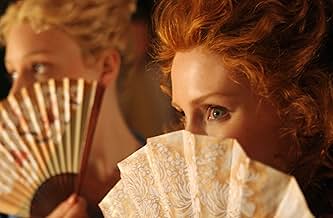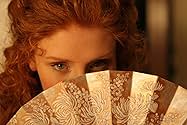AVALIAÇÃO DA IMDb
6,0/10
4 mil
SUA AVALIAÇÃO
A filha de um poderoso Duque deve mostrar sua coragem e inventividade para estar com o homem que ela ama.A filha de um poderoso Duque deve mostrar sua coragem e inventividade para estar com o homem que ela ama.A filha de um poderoso Duque deve mostrar sua coragem e inventividade para estar com o homem que ela ama.
- Direção
- Roteiristas
- Artistas
- Prêmios
- 1 vitória e 6 indicações no total
Nobuyuki Takano
- Charles
- (as Nobuyuki "Daishi" Takano)
- Direção
- Roteiristas
- Elenco e equipe completos
- Produção, bilheteria e muito mais no IMDbPro
Avaliações em destaque
Seeing As You Like It, William Shakespeare's romantic comedy of mistaken identity brought back memories of an amateur production of the Carousel Theater here in Vancouver many years ago in which my son David played a small role. It was a wonderful presentation that thoroughly captured the genius of Shakespeare's delightful imagination. Unfortunately, the new filmed version by Kenneth Branagh with its big budget and professional cast is not in the least bit as convincing or entertaining. It is miscast, over produced, over acted, and simplistic with its multi-layered plot made easier to follow than Sesame Street.
Set in Japan in the 19th Century after the country was opened to the West as a trading partner, the royalty of England have been reinvented as wealthy merchants living on the Japanese seacoast. Neither the opulent backgrounds nor the conceit of the script, however, has any impact on either understanding or enjoyment of the play and the setting seems to be simply a marketing decision not an artistic one. The film opens with a kabuki scene at the court of Duke Senior (Brian Blessed). His brother Frederick, also played by Blessed with black hair, interrupts the proceedings to forcibly overthrow his brother's dukedom and the elder Duke is banished to the Arden Forest. Orlando, played by the Nigerian born David Oyelowo, and his brother Oliver (Adrian Lester) then proceed to fight over their position in the court.
Oliver, aligned with Frederick, entices his brother to take on a 300-pound sumo wrestler to all but certain doom but, as the script will have it, the underdog prevails in spite of a weight differential of about 150 pounds. In addition to being victorious at sport, he also falls for one of his well-wishers, the attractive Rosalind (Bryce Dallas Howard), daughter of Duke Senior. Fearful of her safety at the court, Rosalind, pretending to be a man and, taking the name of Ganymede from the handsome cup bearer to the Gods in Greek mythology, sneaks out with her cousin Celia (Romola Garai) and the clown Touchstone (Alfred Molina) to seek out her father in the Forest of Arden. Soon they are joined by Orlando who also fears for his life after a fight with his brother Oliver over their inheritance.
Before long, a bunch of other personages wander into the film including a melancholy philosopher named Jaques (Kevin Kline) who is described as "an exiled courtier", a young shepherd Silvius (Alex Wyndham) who pursues his reluctant girlfriend Phebe (Jade Jefferies), and others. Curiously, there are two characters named Jaques and two named Oliver, something that most writers would go to any length to avoid. The play is best noted for the cynical soliloquy chronicling the seven ages of man, "All the world's a stage and all the men and women merely players: They have their exits and their entrances, and one man in his time plays many parts", delivered with properly dour expression by Kline.
It would not be a Shakespearean comedy without some gender confusion and Rosalind, after noticing Orlando's love poems neatly positioned on trees all over their neck of the woods, knows that Orlando loves her. Approaching Orlando in her boy disguise as Ganymede, Rosalind endeavors to teach him the finer points of courtship if he would just pretend that he is a she. She uses her charm to seduce Orlando, but also is drawn reluctantly into a relationship with the shepherdess Phebe. In Elizabethan conventions, this meant that a boy playing the girl Rosalind would dress as a boy and then be wooed by another boy playing Phebe.
Quite naturally, this being a comedy and all, everyone ends up happy, (dramatized in a finale of the utmost silliness by Branagh) except for Jaques who, in character, decides not to return to the court. All the pieces are in place for the film to be successful but there are key elements that work against it. For the play to work at all, Rosalind has to be believable as a young man. If she is not, Orlando looks like a complete fool, and the play is robbed of its intended homoerotic playfulness. In this case, Branagh does not even attempt to have Rosalind look masculine and the scenes with Orlando in which he/she is teaching him how to express his love are unconvincing (unless you read it that Orlando goes along with the ruse and the author is simply making a statement about role playing, the masks people wear (himself?) in life, and the inauthenticity of self).
Rosalind is supposed to be pure, innocent, perhaps a little naïve but definitely virtuous. Howard, however, is very un-maiden like in appearance and manner and lacks any noticeable chemistry with her lover. She tries so hard to put the correct inflections in the words that she robs them of whatever poetry they might have had, conveying the impression that she is trying out eagerly for a grammar school play. This is Branagh's fifth attempt to put Shakespeare on film and I'm sure it won't be his last. After achieving considerable artistic but not financial success with the first three, he has opted in this latest film for less of an artistic statement than an overtly commercial approach. Love's Labours Lost was an unmitigated disaster scorched by the critics and shunned by audiences. Unfortunately, As You Like It may follow in its path.
Set in Japan in the 19th Century after the country was opened to the West as a trading partner, the royalty of England have been reinvented as wealthy merchants living on the Japanese seacoast. Neither the opulent backgrounds nor the conceit of the script, however, has any impact on either understanding or enjoyment of the play and the setting seems to be simply a marketing decision not an artistic one. The film opens with a kabuki scene at the court of Duke Senior (Brian Blessed). His brother Frederick, also played by Blessed with black hair, interrupts the proceedings to forcibly overthrow his brother's dukedom and the elder Duke is banished to the Arden Forest. Orlando, played by the Nigerian born David Oyelowo, and his brother Oliver (Adrian Lester) then proceed to fight over their position in the court.
Oliver, aligned with Frederick, entices his brother to take on a 300-pound sumo wrestler to all but certain doom but, as the script will have it, the underdog prevails in spite of a weight differential of about 150 pounds. In addition to being victorious at sport, he also falls for one of his well-wishers, the attractive Rosalind (Bryce Dallas Howard), daughter of Duke Senior. Fearful of her safety at the court, Rosalind, pretending to be a man and, taking the name of Ganymede from the handsome cup bearer to the Gods in Greek mythology, sneaks out with her cousin Celia (Romola Garai) and the clown Touchstone (Alfred Molina) to seek out her father in the Forest of Arden. Soon they are joined by Orlando who also fears for his life after a fight with his brother Oliver over their inheritance.
Before long, a bunch of other personages wander into the film including a melancholy philosopher named Jaques (Kevin Kline) who is described as "an exiled courtier", a young shepherd Silvius (Alex Wyndham) who pursues his reluctant girlfriend Phebe (Jade Jefferies), and others. Curiously, there are two characters named Jaques and two named Oliver, something that most writers would go to any length to avoid. The play is best noted for the cynical soliloquy chronicling the seven ages of man, "All the world's a stage and all the men and women merely players: They have their exits and their entrances, and one man in his time plays many parts", delivered with properly dour expression by Kline.
It would not be a Shakespearean comedy without some gender confusion and Rosalind, after noticing Orlando's love poems neatly positioned on trees all over their neck of the woods, knows that Orlando loves her. Approaching Orlando in her boy disguise as Ganymede, Rosalind endeavors to teach him the finer points of courtship if he would just pretend that he is a she. She uses her charm to seduce Orlando, but also is drawn reluctantly into a relationship with the shepherdess Phebe. In Elizabethan conventions, this meant that a boy playing the girl Rosalind would dress as a boy and then be wooed by another boy playing Phebe.
Quite naturally, this being a comedy and all, everyone ends up happy, (dramatized in a finale of the utmost silliness by Branagh) except for Jaques who, in character, decides not to return to the court. All the pieces are in place for the film to be successful but there are key elements that work against it. For the play to work at all, Rosalind has to be believable as a young man. If she is not, Orlando looks like a complete fool, and the play is robbed of its intended homoerotic playfulness. In this case, Branagh does not even attempt to have Rosalind look masculine and the scenes with Orlando in which he/she is teaching him how to express his love are unconvincing (unless you read it that Orlando goes along with the ruse and the author is simply making a statement about role playing, the masks people wear (himself?) in life, and the inauthenticity of self).
Rosalind is supposed to be pure, innocent, perhaps a little naïve but definitely virtuous. Howard, however, is very un-maiden like in appearance and manner and lacks any noticeable chemistry with her lover. She tries so hard to put the correct inflections in the words that she robs them of whatever poetry they might have had, conveying the impression that she is trying out eagerly for a grammar school play. This is Branagh's fifth attempt to put Shakespeare on film and I'm sure it won't be his last. After achieving considerable artistic but not financial success with the first three, he has opted in this latest film for less of an artistic statement than an overtly commercial approach. Love's Labours Lost was an unmitigated disaster scorched by the critics and shunned by audiences. Unfortunately, As You Like It may follow in its path.
I have to admit that I don't really care for most of Shakespeare's comedies, which involve huge casts, pairs of lovers, and a lot of talking at chance meetings. So it is with AS YOU LIKE IT, which I suspect for most people will only be really enjoyable as a lot of scattered scenes performed by some really good actors. That said, it's been going on 20 years (!) since Branagh first started directing these Shakespeare extravaganzas, so what point has he gotten to? First, the bad points, then the good points.
After almost 20 years, it's clear that Branagh has almost no new ideas when it comes to moving the camera around. A lot of the shots and gimmicks have been ripped straight from HENRY V and MUCH ADO ABOUT NOTHING. Sometimes they're simple and effective and the right choices; other times, the recycling is just embarrassing.
Second, Branagh continues to bite off more than he can chew by attempting novel or gimmicky stagings of these venerable old plays as films, a trend that he began with HAMLET (Four Hour Hamlet! No Lines Cut!), carried through to LOVE'S LABOURS LOST (an ambitious failure, but still a failure with a Capital F) and now here with an AS YOU LIKE IT set in Japan, a choice comprehensible only because Branagh explains it to the audience with several title cards. Which means, it's an incomprehensible choice because he has to explain it so much. This is the sort of adventurous staging that works OK on the London stage, where there are 100 Shakespeare stagings a year and this sort of transposition is expected in order to keep things fresh. But on film, it is mostly confusing (although very pretty).
Now for the good things, and they are very much worth noting as hopeful signs for the future of Branagh's grand Shakespearean experiment.
The casting in this film is almost uniformly excellent. Branagh has (mercifully) abandoned showy stunt casting in favor of assembling a diverse cast that actually can act and actually has Shakespearean experience. Kevin Kline, David Oyewelo, the lovely Bryce Dallas Howard, Adrian Lester, Alfred Molina, Romola Garai (a real surprise)... you're in good hands with all these performers, which is not something you could say of a Branagh Shakespeare film since HENRY V. Furthermore, Branagh has stopped the nonsense where anyone can just show up on these films sporting whatever accents they like, regardless of the film's time or place setting (which was tolerable in MUCH ADO, but silly in HAMLET and excruciating in LOVE'S LABOURS LOST). This film is about English characters: so everyone's got an English accent, even the Americans. Thank God. Branagh has also managed a way to cast fine actors of color without trying to make us believe that a black actor and white actor are siblings (MUCH ADO, again).
Bryce Dallas Howard -- dare I say it -- it a better actress and more luminously beautiful and commanding a screen presence than Emma Thompson was in MUCH ADO ABOUT NOTHING.
Even more surprisingly, Branagh has also given his faithful old company of secondary players from the old Renaissance Theatre Company -- you'll recognize them from his previous films -- room to actually act like the professionals they are. Brian Blessed doesn't quite pull it off in a dual role, and well, Richard Briers is ubiquitous in Branagh's films, but Richard Clifford, Jimmy Yuill, Gerard Horan and Patrick Doyle are given a little bit more to do and it's a real asset to the film. These performers assist in giving AS YOU LIKE IT -- dare I say it (dare I even hope it) -- the earthy, humanistic feel that made his HENRY V so very memorable. Which leads one to wonder: WHY did Branagh go for all this flash and glitter with Hollywood stars (starting with MUCH ADO) in the first place, eventually leading to the train wreck that was LOVE's LABOURS LOST? Why didn't he just stick with the approach that worked so brilliantly with HENRY V - still one of the greatest Shakespeare films of all time? For God's sake... BRING BACK THE RENAISSANCE THEATRE COMPANY!!!!
If Branagh has not really grown as a director, this film shows that his creative team -- cinematographer Roger Lanser, production designer Tim Harvey, and composer Patrick Doyle -- continue to do him just as good service as ever, and even seem to kick it up a notch.
The verdict? A problematic film, one that might not appeal to everyone, and decidedly less showy or fun than his popular MUCH ADO... but all in all, a definite step forward for the great Branagh Shakespeare film project. He should get another chance from HBO Films to do another one.
After almost 20 years, it's clear that Branagh has almost no new ideas when it comes to moving the camera around. A lot of the shots and gimmicks have been ripped straight from HENRY V and MUCH ADO ABOUT NOTHING. Sometimes they're simple and effective and the right choices; other times, the recycling is just embarrassing.
Second, Branagh continues to bite off more than he can chew by attempting novel or gimmicky stagings of these venerable old plays as films, a trend that he began with HAMLET (Four Hour Hamlet! No Lines Cut!), carried through to LOVE'S LABOURS LOST (an ambitious failure, but still a failure with a Capital F) and now here with an AS YOU LIKE IT set in Japan, a choice comprehensible only because Branagh explains it to the audience with several title cards. Which means, it's an incomprehensible choice because he has to explain it so much. This is the sort of adventurous staging that works OK on the London stage, where there are 100 Shakespeare stagings a year and this sort of transposition is expected in order to keep things fresh. But on film, it is mostly confusing (although very pretty).
Now for the good things, and they are very much worth noting as hopeful signs for the future of Branagh's grand Shakespearean experiment.
The casting in this film is almost uniformly excellent. Branagh has (mercifully) abandoned showy stunt casting in favor of assembling a diverse cast that actually can act and actually has Shakespearean experience. Kevin Kline, David Oyewelo, the lovely Bryce Dallas Howard, Adrian Lester, Alfred Molina, Romola Garai (a real surprise)... you're in good hands with all these performers, which is not something you could say of a Branagh Shakespeare film since HENRY V. Furthermore, Branagh has stopped the nonsense where anyone can just show up on these films sporting whatever accents they like, regardless of the film's time or place setting (which was tolerable in MUCH ADO, but silly in HAMLET and excruciating in LOVE'S LABOURS LOST). This film is about English characters: so everyone's got an English accent, even the Americans. Thank God. Branagh has also managed a way to cast fine actors of color without trying to make us believe that a black actor and white actor are siblings (MUCH ADO, again).
Bryce Dallas Howard -- dare I say it -- it a better actress and more luminously beautiful and commanding a screen presence than Emma Thompson was in MUCH ADO ABOUT NOTHING.
Even more surprisingly, Branagh has also given his faithful old company of secondary players from the old Renaissance Theatre Company -- you'll recognize them from his previous films -- room to actually act like the professionals they are. Brian Blessed doesn't quite pull it off in a dual role, and well, Richard Briers is ubiquitous in Branagh's films, but Richard Clifford, Jimmy Yuill, Gerard Horan and Patrick Doyle are given a little bit more to do and it's a real asset to the film. These performers assist in giving AS YOU LIKE IT -- dare I say it (dare I even hope it) -- the earthy, humanistic feel that made his HENRY V so very memorable. Which leads one to wonder: WHY did Branagh go for all this flash and glitter with Hollywood stars (starting with MUCH ADO) in the first place, eventually leading to the train wreck that was LOVE's LABOURS LOST? Why didn't he just stick with the approach that worked so brilliantly with HENRY V - still one of the greatest Shakespeare films of all time? For God's sake... BRING BACK THE RENAISSANCE THEATRE COMPANY!!!!
If Branagh has not really grown as a director, this film shows that his creative team -- cinematographer Roger Lanser, production designer Tim Harvey, and composer Patrick Doyle -- continue to do him just as good service as ever, and even seem to kick it up a notch.
The verdict? A problematic film, one that might not appeal to everyone, and decidedly less showy or fun than his popular MUCH ADO... but all in all, a definite step forward for the great Branagh Shakespeare film project. He should get another chance from HBO Films to do another one.
How dumb do you have to be to watch a Shakespeare film and then complain, like certain reviews here, that it has Shakespeare's dialogue? What did you expect? Apart from anything else, the dialogue - the poetry of the greatest-ever writer of English - is the whole point. Without that, you have only a highly improbable story made up of contrived situations connected together only tenuously. With it - if it is well performed - a golden, magical glow of love and wit. If you don't understand it, rather than expecting it to be dumbed down to your level you should be prepared to put a bit of work in, read the play over slowly and puzzle it out - or else just admit that it is over your head. But don't blame the play for your own deficiencies.
I'm not fond, though, of the modern fashion for productions with apparently random, irrelevant concepts - in this case old-time Japan - to which Branners adds by his insistence on casting American stars who (inevitably) can't really handle the dialogue.
I'm not fond, though, of the modern fashion for productions with apparently random, irrelevant concepts - in this case old-time Japan - to which Branners adds by his insistence on casting American stars who (inevitably) can't really handle the dialogue.
As You Like It is my favorite Shakespearean comedy, and my high expectations of the new Branagh version were not put to shame. Set in a lush, beautiful forest in an imaginary old Japan, populated by people of all races, this version is an innovative and modern one rather than a conventional and classical one - and it works.
The female main characters, Rosalind, Celia, Phebe and Audrey, are all immensely good, effortlessly throwing around both unbridled enthusiasm and unwavering character acting. In fact, Celia is near to outshining Rosalind; only her obviously bleached hair detracts from her charm.
The male characters are, sadly, far less distinctive, with the exception of Alfred Molina's Touchstone, who's delightfully silly - almost too much so. Kevin Kline's Jacques is not bad either, but he doesn't really steal the limelight to any great extent, the way he perhaps should. In a production as colorful as this one, Jacques greyness gets a bit lost.
(Edit: I will say that this version gains from repeated viewings. It is a great modern adaptation of Shakespeare's perhaps most joyous comedy.)
I did feel that a lot of the original text was missing, and this, as is so often the case with Shakespeare movies, is this production's worst shortcoming. Not enough of the delightful Rosalind rhymes which almost define the play ("Winter garments must be lined / So must slender Rosalind") are included, which is a grave, grave error in disposition. If this play was often made into movies, that judgment might be justified, but since the play is adapted so rarely, it cannot be.
The overall filming and cinematography are excellent, however, with plentiful gentle camera movement and many close-ups, focusing admirably on the strong emotions exchanged between the characters, and the language is fluid as well as florid, spoken in a very modern, sometimes even casual, tone, as we have come to expect from Branagh's very accessible Shakespeare films.
We are many who wonder why this film has not received a wide cinematic release. It has been shown only on a few film festivals, and this January it will be out on DVD, at least in Italy. Is it going straight to DVD without a run in international theaters? Why?? Is it really seen to be so obscure and uncommercial that no distribution company will commit to it? If so, distributors should be ashamed.
My rating: 9 out of 10.
The female main characters, Rosalind, Celia, Phebe and Audrey, are all immensely good, effortlessly throwing around both unbridled enthusiasm and unwavering character acting. In fact, Celia is near to outshining Rosalind; only her obviously bleached hair detracts from her charm.
The male characters are, sadly, far less distinctive, with the exception of Alfred Molina's Touchstone, who's delightfully silly - almost too much so. Kevin Kline's Jacques is not bad either, but he doesn't really steal the limelight to any great extent, the way he perhaps should. In a production as colorful as this one, Jacques greyness gets a bit lost.
(Edit: I will say that this version gains from repeated viewings. It is a great modern adaptation of Shakespeare's perhaps most joyous comedy.)
I did feel that a lot of the original text was missing, and this, as is so often the case with Shakespeare movies, is this production's worst shortcoming. Not enough of the delightful Rosalind rhymes which almost define the play ("Winter garments must be lined / So must slender Rosalind") are included, which is a grave, grave error in disposition. If this play was often made into movies, that judgment might be justified, but since the play is adapted so rarely, it cannot be.
The overall filming and cinematography are excellent, however, with plentiful gentle camera movement and many close-ups, focusing admirably on the strong emotions exchanged between the characters, and the language is fluid as well as florid, spoken in a very modern, sometimes even casual, tone, as we have come to expect from Branagh's very accessible Shakespeare films.
We are many who wonder why this film has not received a wide cinematic release. It has been shown only on a few film festivals, and this January it will be out on DVD, at least in Italy. Is it going straight to DVD without a run in international theaters? Why?? Is it really seen to be so obscure and uncommercial that no distribution company will commit to it? If so, distributors should be ashamed.
My rating: 9 out of 10.
An overthrown local monarch takes to the woods with a handful of loyal followers. His daughter also flees also, at a different time, following her true love (but dressed as a man). Only in Shakespeare do fathers/brothers/lovers not recognize each other because they're in different clothes.
Kenneth Branagh is good. He's very good. In fact, he's darn good. But he's not as good as he thinks.
He made a slight shift in locations for "Much Ado About Nothing" and it worked better than he could have hoped. He set Hamlet in a Ruritanian Denmark. Fine. I enjoyed it (helped along, I think, by the fact that I was just coming down with flu in 1996 and during the movie show my temperature shot up to 103).
But setting "As You Like It" in Japan was a risk. It also may be the only version some people ever see, which is a perversion. Whether it works is, of course, subjective. The movie's not bad but downbeat for a comedy. See it and make up your own mind.
(Fortunately, in "The Shakespeare Plays," comedies came out best, and the more conventional "As You Like It" with Helen Mirren is still wonderful, as is the Jacobean-set "Twelfth Night" with Felicity Kendall and the "Much Ado" with Cherie Lunghi; so anyone wanting more Shakespearean interpretations of these Shakespeare plays have those to fall back on. Get a region-free dvd/blu-ray player, if necessary.)
This version has Branagh's typical mix of his stock company (Brian Blessed, Richard Briars) and currently popular stars given a chance to display their acting chops. Some work better than others. In previous efforts Denzell Washington and Charlton Heston came off well; Keenu Reeves and Jack Lemmon, less so.
Shakespeare grew up near the forest of Arden and no doubt played there (as I did in a huge woods I grew up adjacent to) and remembered it in his manhood as a mystical place (as I do mine). He embued it with wonder, so much so the eggheads insist it's not that forest of Arden where "As You Like It" took place but in another of the same name. What was I saying about fathers and lovers not recognizing loved ones in different clothes? It's the same sort of thing.
I wished Branagh had made more Shakespeare in the 1990s when it was popular; but now I'm not so sure. Of course, funding is always a problem.
This version of "As You Like It" has one serious lack: Branagh himself. I like seeing him around but he remains behind the camera. I never wanted "Henry V," "Much Ado," and "Hamlet" to end. I watched the clock on this one.
But this version has a nice surprise ending. Stick around.
Kenneth Branagh is good. He's very good. In fact, he's darn good. But he's not as good as he thinks.
He made a slight shift in locations for "Much Ado About Nothing" and it worked better than he could have hoped. He set Hamlet in a Ruritanian Denmark. Fine. I enjoyed it (helped along, I think, by the fact that I was just coming down with flu in 1996 and during the movie show my temperature shot up to 103).
But setting "As You Like It" in Japan was a risk. It also may be the only version some people ever see, which is a perversion. Whether it works is, of course, subjective. The movie's not bad but downbeat for a comedy. See it and make up your own mind.
(Fortunately, in "The Shakespeare Plays," comedies came out best, and the more conventional "As You Like It" with Helen Mirren is still wonderful, as is the Jacobean-set "Twelfth Night" with Felicity Kendall and the "Much Ado" with Cherie Lunghi; so anyone wanting more Shakespearean interpretations of these Shakespeare plays have those to fall back on. Get a region-free dvd/blu-ray player, if necessary.)
This version has Branagh's typical mix of his stock company (Brian Blessed, Richard Briars) and currently popular stars given a chance to display their acting chops. Some work better than others. In previous efforts Denzell Washington and Charlton Heston came off well; Keenu Reeves and Jack Lemmon, less so.
Shakespeare grew up near the forest of Arden and no doubt played there (as I did in a huge woods I grew up adjacent to) and remembered it in his manhood as a mystical place (as I do mine). He embued it with wonder, so much so the eggheads insist it's not that forest of Arden where "As You Like It" took place but in another of the same name. What was I saying about fathers and lovers not recognizing loved ones in different clothes? It's the same sort of thing.
I wished Branagh had made more Shakespeare in the 1990s when it was popular; but now I'm not so sure. Of course, funding is always a problem.
This version of "As You Like It" has one serious lack: Branagh himself. I like seeing him around but he remains behind the camera. I never wanted "Henry V," "Much Ado," and "Hamlet" to end. I watched the clock on this one.
But this version has a nice surprise ending. Stick around.
Você sabia?
- CuriosidadesThis was the ninth and final film directed by Kenneth Branagh in which Richard Briers stars. The others are Henrique V (1989), Para o Resto de Nossas Vidas (1992), Swan Song (1992), Muito Barulho por Nada (1993), Frankenstein de Mary Shelley (1994), Sonhos de Uma Noite de Inverno (1995), Hamlet (1996) and Amores Perdidos (2000).
- Erros de gravaçãoLions are not native to Japan. The lion is a carryover from the original play, which was set in a generic European country at an indeterminate time in the Middle Ages. Even that didn't make much sense, as lions have been extirpated from the main part of Europe since the 4th century AD, and from the Caucasus since the 10th century. But many Europeans, possibly including William Shakespeare, didn't know that lions weren't around anymore.
- Citações
Touchstone: The fool doth think he is wise, but the wise man knows himself to be a fool.
- Cenas durante ou pós-créditosThe picture seems to end without the play's Epilogue. Then, the closing credits begin, when they are suddenly interrupted by Bryce Dallas Howard, still in character as Rosalind, who then is seen speaking the Epilogue as she begins to walk to her trailer, drinking a cup of coffee along the way. After the speech, Kenneth Branagh can be heard off-screen saying "Aaaand...cut!" After this, the closing credits resume.
- Versões alternativasThe version shown on cable television has been formatted to the aspect ratio commonly used in HDTV production (that is, anywhere from 1.78:1 to 1.85:1), while the version released to movie theatres was released in the typical CinemaScope/Panavision aspect ratio (2.39:1). It is the theatrical version which has been issued on DVD. Since the film was made using the Super 35 format, it was possible to make versions of the film in different aspect ratios.
- ConexõesFeatured in 14th Annual Screen Actors Guild Awards (2008)
- Trilhas sonorasUnder the Greenwood Tree
Composed by Patrick Doyle
Lyrics by William Shakespeare
Performed by Patrick Doyle and London Symphony Orchestra
Principais escolhas
Faça login para avaliar e ver a lista de recomendações personalizadas
- How long is As You Like It?Fornecido pela Alexa
Detalhes
- Data de lançamento
- Países de origem
- Idioma
- Também conhecido como
- As You Like It
- Locações de filme
- Empresas de produção
- Consulte mais créditos da empresa na IMDbPro
Bilheteria
- Faturamento bruto mundial
- US$ 563.162
- Tempo de duração
- 2 h 7 min(127 min)
- Cor
- Mixagem de som
Contribua para esta página
Sugerir uma alteração ou adicionar conteúdo ausente




